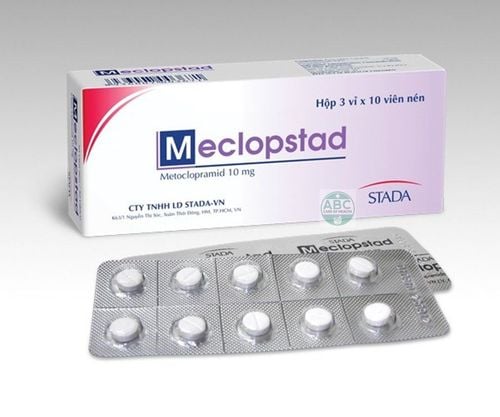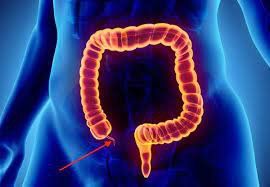This is an automatically translated article.
Ulcerative colitis is rarer in children than it is in adults. This disease can lead to a number of problems with the development and growth of a child during puberty. So how to care for children with colitis and what should children with colon eat? The following article will show a few nutritional tips for children with ulcerative colitis in children and how to prevent it.
1. What is ulcerative colitis in children?
Ulcerative colitis is an inflammatory bowel disease (IBD) in which the lining of the large intestine and rectum becomes inflamed. Inflammation usually begins in the rectum and lower intestine (sigmoid colon) and spreads up to the entire colon.
Inflammation that causes diarrhea or frequent emptying of the colon. When cells on the surface of the colon lining die and shed, sores (open sores) form, causing pus, mucus, and bleeding.
1.1. Causes of ulcerative colitis in children There are many causes of ulcerative colitis in children and are currently unknown but it is thought to be caused by a combination of several factors including an active immune system. Overactivity, genetics, the environment, or eating a high-fat diet may slightly increase your risk of developing ulcerative colitis.

Bệnh viêm loét đại tràng ở trẻ em cần được phát hiện sớm và điều trị
Abdominal pain Bloody diarrhea Fatigue Weight loss Loss of appetite Rectal bleeding Loss of fluids and nutrients in the body Anemia from bleeding Severe bleeding In addition, some other symptoms of ulcerative colitis in children :
Skin lesions Joint pain Eye inflammation Liver disorders Osteoporosis Rash Kidney stones

Trẻ bị viêm loét đại tràng thường có biểu hiện tiêu chảy
2. Some nutritional tips for ulcerative colitis in children
Many children with IBD worry that they will no longer be able to enjoy their favorite foods or eat with their friends. Because IBD affects the organs responsible for absorbing vitamins, nutrients, and water, it's important for your child to maintain a healthy diet with proper nutrition. Proper nutrition along with disease control will help your child lead a healthy life and reach their full potential.
2.1. What should children eat when they have ulcerative colitis? When your child's IBD is well managed or in remission, it is important for them to maintain a healthy diet. Talk to your child's doctor about the type and amount of food recommended for them based on their disease activity and distribution. A healthy diet includes a variety of foods from all food groups:
Fruits and vegetables: Fruits and vegetables contain fiber and essential minerals like vitamin C, potassium and folate. Grains: Whole grains are an important source of fiber, B vitamins, folate, and iron and provide much-needed energy for growing bodies. Protein: includes meat and non-meat sources such as soybeans, nuts, seeds, and beans. These are important sources of B vitamins, zinc and iron. Protein is important for healing and repairing body tissues. If your child's iron is low, they may feel tired and have trouble concentrating. Dairy products: includes milk and dairy products. Milk provides an excellent source of protein, calcium and vitamin D for strong bones. Healthy fats: Healthy fats including fish, plant-based foods, avocados, fish oils, and nuts are tolerated. These foods absorb fat-soluble minerals and help the body meet calorie needs. Sweets and salty snacks don't provide your child with the nutrients he or she needs. Eating these foods without getting enough of the foods from the food groups above can prevent your child from getting what they need to grow, grow, and participate in the things they enjoy. If you notice your child has symptoms when eating foods from a particular food group, you can work with their healthcare provider or dietitian to replace nutrients. nourish it with food, vitamins, or other mineral supplements.

Trứng rán là món ăn đơn giản, dễ làm, tốt cho người bị viêm loét đại tràng
Typical foods for children with colitis are:
Lean meat and poultry are recommended after an ulcer because protein is often lost. Increasing your child's protein intake can help replenish nutrients lost during a flare. Eggs are another great source of protein and are generally well tolerated even during flare-ups. Some eggs are fortified with omega-3 fatty acids, which can help reduce inflammation. Choose young leafy vegetables such as jute, spinach, etc. Probiotics, commonly found in yogurt, kefir, sauerkraut and miso, are good bacteria that can aid in digestion. Choose yogurt low in added sugar, as sugar can worsen ulcerative colitis symptoms. Avocados are an excellent source of protein and healthy fats. They are high in calories, but because they are about 70% water, they are easy to digest. Instant oatmeal contains refined grains and is often easier than steel-cut oatmeal or old-fashioned oatmeal because it has a little less fiber. Squash is a healthy option that is usually well-tolerated during an ulcerative colitis flare-up. It is full of fiber, vitamin C and beta carotene. Some people can tolerate juices and smoothies during a flare-up and can help you maintain good nutrition. Carrot juice is full of vitamin A and antioxidants and many people with ulcerative colitis find it tolerable. Young children should increase breastfeeding. 2.2. What should children not eat when they have ulcerative colitis? Dietary choices do not cause ulcerative colitis in children, but certain foods can trigger and worsen symptoms. Learning to identify trigger foods can help reduce the frequency and severity of ulcerative colitis symptoms for your child. Not all children with ulcerative colitis have the same triggers, but you should not give them the following foods:
Caffeine is found in coffee, tea, chocolate and water. stimulant, is a stimulant and can speed up transit time in the colon, leading to more frequent bowel movements.
Carbonated soft drinks including sodas and beer contain carbonation which can irritate the digestive tract and cause bloating. Many contain sugar, caffeine, or artificial sweeteners, which can also be triggers for ulcerative colitis.
Avoid dairy products if you are lactose intolerant, as they can cause symptoms similar to ulcerative colitis. Not everyone with ulcerative colitis is lactose intolerant.
Dried beans, peas and legumes are all rich in fiber and can increase bowel movements, abdominal pain and bloating. If you're a vegetarian or vegan, you can try these foods in small amounts or puree to see if they don't cause symptoms.
Dried fruits, berries, fruits with pulp or seeds are other high-fiber foods that can trigger ulcerative colitis symptoms.
Foods containing sulfur or sulfates can produce excess gas. Sulfate can be found in many foods, including some juices, dairy products, eggs, cheese, dates, dried apples and apricots, almonds, pasta, bread, peanuts , cruciferous vegetables, raisins, prunes, red meat and some supplements.
Meats, especially fatty meats, can cause ulcerative colitis symptoms. Excess fat may not be absorbed properly during flare-ups and this can make symptoms worse. Red meat can contain a lot of sulfates, which cause gas.
Popcorn is another high fiber food that is not completely digested by the small intestine and can cause diarrhea and urgent bowel movements.
Sugar alcohols (such as sorbitol and mannitol) are found in sugar-free gum and candy, some ice creams, some fruits, and fruit juices (apples, pears, peaches, and prunes) and have May cause diarrhea, gas and bloating in some children
Chocolate contains caffeine and sugar, both of which can irritate the digestive tract, causing cramps and more frequent bowel movements.
Vegetables, especially raw vegetables, are high in fiber, difficult to digest, causing gas and bloating. This is especially true for root vegetables like broccoli, celery, cabbage, onions, and Brussels sprouts.

Nước ngọt có ga có thể là tác nhân gây viêm loét đại tràng không nên cho trẻ uống
2.3. Food tips for ulcerative colitis flares in children When your child is showing symptoms of IBD or when their illness is in flare, these food tips can help:
Eat Eat smaller meals more often to reduce cramps Reduce the amount of greasy or fried foods they eat Remind your child to eat slowly, chew well, avoid reading books, newspapers, watching movies at the same time, to help increase secretion of saliva, easier digestion Avoid foods that have previously made symptoms worse and focus on foods that are tolerable Limit certain foods high in fiber such as seeds, nuts, popcorn, beans, green leafy vegetables, wheat bran, raw fruits and vegetables. Do not let children too hungry make the stomach empty, stronger contractions cause pain, even bleeding; or eating too full makes the stomach and stomach stretch, weak contractions affect the process of mixing food, increasing rubbing increases pain Avoid eating too thick, making it difficult for gastric juices to penetrate the middle of the food, or eat Too much liquid and too much water dilute the gastric juice, reduce the ability to digest. Avoid eating foods that are too hot or too cold. Both make the stomach contract harder, causing pain. Warm food about 40-50 degrees Celsius is good for digestion, easy to absorb. Limit milk or dairy products if your child is lactose intolerant. Avoid caffeine in soda, tea, and other caffeinated beverages. Caffeine can act as a stimulant to "stimulate" the intestines, leading to diarrhea Ask your child's doctor about vitamin and mineral supplements, such as vitamin D and calcium. Encourage your child to drink as much water as possible. Your child's symptoms during a flare can make him or her dehydrated If appetite drops during a flare, talk to your child's doctor about providing supplements to help meet nutritional needs
3. Teach your child to choose food
When children eat healthy, they are more likely to follow good habits as adults. Teaching your kids to be involved in their eating habits is important as they grow into adulthood and beyond. For children with IBD, meal planning, preparing, and shopping for food can take a little more preparation. Remind your kids that healthy eating can give them: more energy, better focus, and help them feel better overall. Eating healthy can also improve behavior and the ability to absorb medications. Here are some nutrition tips for children with colitis to get started to help them become more involved in their food decisions:
Involve children in meal planning and preparation. Participating in the process not only teaches kids great skills, but it also shows them how to create a healthy meal for themselves.
Take your kids shopping with them: Some children with IBD need to eliminate specific ingredients from their diet or eat only certain foods. Teaching children how to read food labels and what ingredients to look for is a very important skill for IBD patients. By involving your child in the shopping process, they can begin to learn how to make healthy choices independently.
Help your child keep a food diary: Keeping track of what your child is eating and how their body is responding is key to understanding how diet can affect their IBD. If you feel the need to limit certain foods in your child's diet, discuss it with your child's doctor or dietitian.
When eating out, allow your child to look through the menu or read with them to see what works for their diet. Remind your child that when in doubt, it's best to keep it simple with boiled, grilled, steamed or sautéed options and that sauces and condiments should also be limited.
Children in the period from 6 months to 3 years old are very susceptible to respiratory problems, respiratory infections, skin diseases and gastrointestinal infections,... Parents need special Pay attention to the care and provide adequate nutrition for children. Pediatrics Department at Vinmec International General Hospital is the address for receiving and examining diseases that infants and young children are susceptible to: viral fever, bacterial fever, otitis media, pneumonia in children With a system of facilities, modern medical equipment, sterile space, minimizing the impact as well as the risk of disease spread, Vinmec will bring satisfaction to customers. and is highly appreciated by industry experts with:
Gathering a team of leading pediatricians: Including leading experts with high professional qualifications (professors, associate professors, doctors, Master's degree), experienced, worked at major hospitals such as Bach Mai, 108.. The doctors are all well-trained, professional, conscientious, knowledgeable about young psychology. Besides domestic pediatricians, the Department of Pediatrics also has the participation of foreign experts (Japan, Singapore, Australia, USA) who are always pioneers in applying the latest and most effective treatment regimens. . Comprehensive services: In the field of Pediatrics, Vinmec provides a series of continuous medical examination and treatment services from Newborn to Pediatric and Vaccine,... according to international standards to help parents take care of their baby's health from birth to childhood. Advanced techniques: Vinmec has successfully deployed many specialized techniques to make the treatment of difficult diseases in Pediatrics more effective: neurosurgery - skull surgery, stem cell transplantation blood in cancer treatment. Professional care: In addition to understanding children's psychology, Vinmec also pays special attention to the children's play space, helping them to play comfortably and get used to the hospital's environment, cooperate in treatment, improve the efficiency of medical treatment.
Please dial HOTLINE for more information or register for an appointment HERE. Download MyVinmec app to make appointments faster and to manage your bookings easily.













